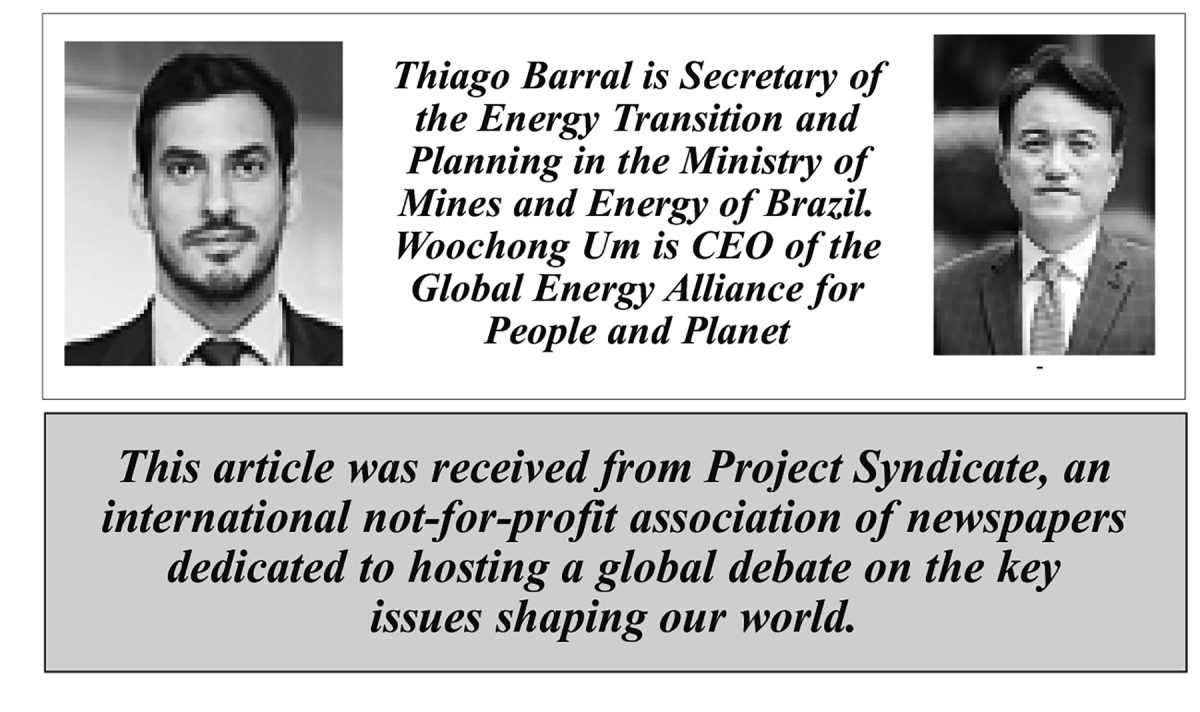By Thiago Barral and Woochong Um
RIO DE JANEIRO/NEW YORK – November’s United Nations Climate Change Conference (COP29) in Baku, dubbed the “Finance COP,” left many deeply disappointed – for good reason. While the pledge to mobilize $300 billion in climate finance by 2035 is a good start, it falls far short of what is needed to accelerate the development of low-carbon energy systems in low- and middle-income countries.
Improving access to renewable energy is particularly urgent in Latin America and the Caribbean (LAC), where 60 million people live without reliable power and 16 million lack even basic access to electricity. This energy gap underscores the need for sustainable and inclusive solutions.
Accelerating the global energy transition depends on advancing economic and social development. One way to achieve this is to integrate modern, sustainable energy into every industry, community, and household across the region, ensuring that the benefits of long-term development are widely shared.
To be sure, LAC countries have made major strides toward universal energy access, with 60% of their power coming from renewables and more than 98% of the region’s population connected to electricity grids. But progress has slowed to a crawl. Since 2010, electrification rates have increased by only three percentage points, a clear sign that conventional approaches are not enough to close the remaining access gaps.
Consider Haiti, where just 47% of the population has access to electricity, and communities in many remote areas rely on expensive and polluting fossil-fuel generators. Similarly, vast areas in countries like Guatemala and Bolivia still lack reliable power infrastructure. This has profound consequences for economic development, as reliable electricity is needed to deliver clean water, improve health care and education, and enable small businesses to grow.
Despite efforts by governments and the private sector, achieving universal energy access remains costly and technically challenging, particularly for the countries most affected by climate change. These challenges are compounded by high financing costs, political and regulatory instability, and limited domestic credit capacity, all of which impede energy investment across the region.
To tackle this daunting challenge, policymakers must adopt a new strategy that focuses on improving stakeholder coordination, increasing efficiency, and enabling lower-income countries and communities to take the lead. Testing and scaling new technologies and implementing financial mechanisms that channel increased resources are also vital for effective, multisector government programs.
The Universal Access Coalition, launched at the Energies of the Amazon Conference in Belém, Brazil, following November’s G20 summit, is a prime example of this approach. By bringing together governments, private companies, multilateral organizations, development-finance institutions, and civil-society groups, the UAC seeks to mobilize resources, drive innovation, and advocate for universal energy access.
By fostering cooperation among stakeholders, the UAC aims to promote innovative technological solutions. For example, distributed renewable energy, such as mini-grids and solar home systems, represents a faster, more cost-effective alternative to traditional grid expansion in remote regions with low population density. The Global Energy Alliance for People and Planet, in partnership with the World Bank and the Inter-American Development Bank, is also investing in mesh grids – decentralized networks designed to deliver reliable electricity to underserved areas.
LAC countries’ efforts must advance the broader goal of revitalizing global efforts to achieve UN Sustainable Development Goal 7, which calls for universal access to clean, affordable energy by 2030. Targeted government programs in Brazil, such as Energies of the Amazon and Light for All (Luz para Todos), demonstrate how multi-stakeholder approaches can facilitate community-led, equitable initiatives.
Ahead of COP30 in Belém this year, policymakers must reassess the effectiveness of the global response to the existential threat of climate change and commit to bold, decisive action. By harnessing the collective power of governments, civil society, and the private sector, we can unlock LAC countries’ immense renewable-energy potential, transforming the region into a model for sustainable development.
But success cannot be measured in megawatts alone. Energy solutions must actively engage local and indigenous communities and ensure they play a meaningful role in planning and decision-making. A just energy transition is more than a moral imperative – it is the only way to meet global climate goals, build climate resilience, and deliver equitable growth.
Copyright: Project Syndicate, 2025.
